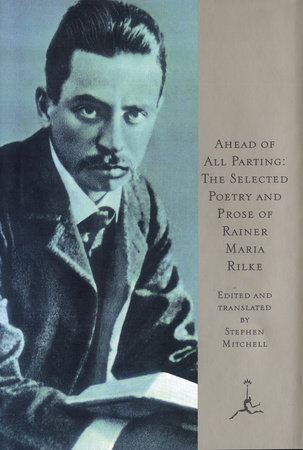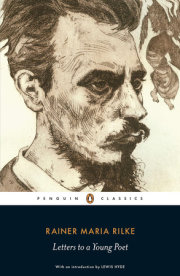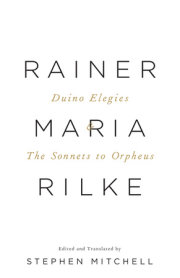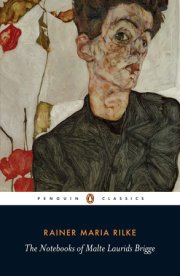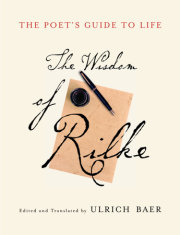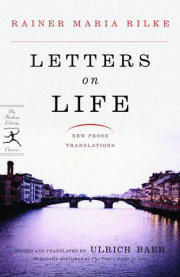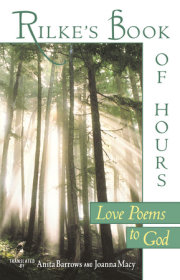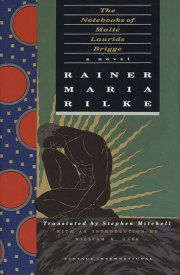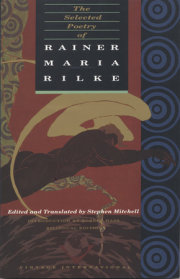FROM
The Book of Hours
(1905)
Ich lebe mein Leben in wachsenden Ringen,
die sich über die Dinge ziehn.
Ich werde den letzten vielleicht nicht vollbringen,
aber versuchen will ich ihn.
Ich kreise um Gott, um den uralten Turm,
und ich kreise jahrtausendelang;
und ich weiß noch nicht: bin ich ein Falke, ein Sturm
oder ein großer Gesang.
[I live my life in widening rings]
I live my life in widening rings
which spread over earth and sky.
I may not ever complete the last one,
but that is what I will try.
I circle around God, the primordial tower,
and I circle ten thousand years long;
and I still don’t know if I’m a falcon, a storm,
or an unfinished song.
Ich bin, du Ängstlicher. Hörst du mich nicht
mit allen meinen Sinnen an dir branden?
Meine Gefühle, welche Flügel fanden,
umkreisen weiß dein Angesicht.
Siehst du nicht meine Seele, wie sie dicht
vor dir in einem Kleid aus Stille steht?
Reift nicht mein mailiches Gebet
an deinem Blicke wie an einem Baum?
Wenn du der Träumer bist, bin ich dein Traum.
Doch wenn du wachen willst, bin ich dein Wille
und werde mächtig aller Herrlichkeit
und ründe mich wie eine Sternenstille
über der wunderlichen Stadt der Zeit.
[I am, O Anxious One. Don’t you hear my voice]
I am, O Anxious One. Don’t you hear my voice
surging forth with all my earthly feelings?
They yearn so high that they have sprouted wings
and whitely fly in circles around your face.
My soul, dressed in silence, rises up
and stands alone before you: can’t you see?
Don’t you know that my prayer is growing ripe
upon your vision, as upon a tree?
If you are the dreamer, I am what you dream.
But when you want to wake, I am your wish,
and I grow strong with all magnificence
and turn myself into a star’s vast silence
above the strange and distant city, Time.
Ich finde dich in allen diesen Dingen,
denen ich gut und wie ein Bruder bin;
als Samen sonnst du dich in den geringen
und in den großen giebst du groß dich hin.
Das ist das wundersame Spiel der Kräfte,
daß sie so dienend durch die Dinge gehn:
in Wurzeln wachsend, schwindend in die Schäfte
und in den Wipfeln wie ein Auferstehn.
[I find you, Lord, in all Things and in all]
I find you, Lord, in all Things and in all
my fellow creatures, pulsing with your life;
as a tiny seed you sleep in what is small
and in the vast you vastly yield yourself.
The wondrous game that power plays with Things
is to move in such submission through the world:
groping in roots and growing thick in trunks
and in treetops like a rising from the dead.
FROM
The Book of Pictures
(1902, 1906)
KLAGE
O wie ist alles fern
und lange vergangen.
Ich glaube, der Stern,
von welchem ich Glanz empfange,
ist seit Jahrtausenden tot.
Ich glaube, im Boot,
das vorüberfuhr,
hörte ich etwas Banges sagen.
Im Hause hat eine Uhr
geschlagen …
In welchem Haus?…
Ich möchte aus meinem Herzen hinaus
unter den großen Himmel treten.
Ich möchte beten.
Und einer von allen Sternen
müßte wirklich noch sein.
Ich glaube, ich wüßte,
welcher allein
gedauert hat,—
welcher wie eine weiße Stadt
am Ende des Strahls in den Himmeln steht …
LAMENT
Everything is far
and long gone by.
I think that the star
glittering above me
has been dead for a million years.
I think there were tears
in the car I heard pass
and something terrible was said.
A clock has stopped striking in the house
across the road …
When did it start?…
I would like to step out of my heart
and go walking beneath the enormous sky.
I would like to pray.
And surely of all the stars that perished
long ago,
one still exists.
I think that I know
which one it is—
which one, at the end of its beam in the sky,
stands like a white city …
HERBSTTAG
Herr: es ist Zeit. Der Sommer war sehr groß.
Leg deinen Schatten auf die Sonnenuhren,
und auf den Fluren laß die Winde los.
Befiehl den letzten Früchten voll zu sein;
gieb ihnen noch zwei südlichere Tage,
dränge sie zur Vollendung hin und jage
die letzte Süße in den schweren Wein.
Wer jetzt kein Haus hat, baut sich keines mehr.
Wer jetzt allein ist, wird es lange bleiben,
wird wachen, lesen, lange Briefe schreiben
und wird in den Alleen hin und her
unruhig wandern, wenn die Blätter treiben.
AUTUMN DAY
Lord: it is time. The huge summer has gone by.
Now overlap the sundials with your shadows,
and on the meadows let the wind go free.
Command the fruits to swell on tree and vine;
grant them a few more warm transparent days,
urge them on to fulfillment then, and press
the final sweetness into the heavy wine.
Whoever has no house now, will never have one.
Whoever is alone will stay alone,
will sit, read, write long letters through the evening,
and wander on the boulevards, up and down,
restlessly, while the dry leaves are blowing.
Copyright © 2015 by Rainer Maria Rilke. All rights reserved. No part of this excerpt may be reproduced or reprinted without permission in writing from the publisher.

